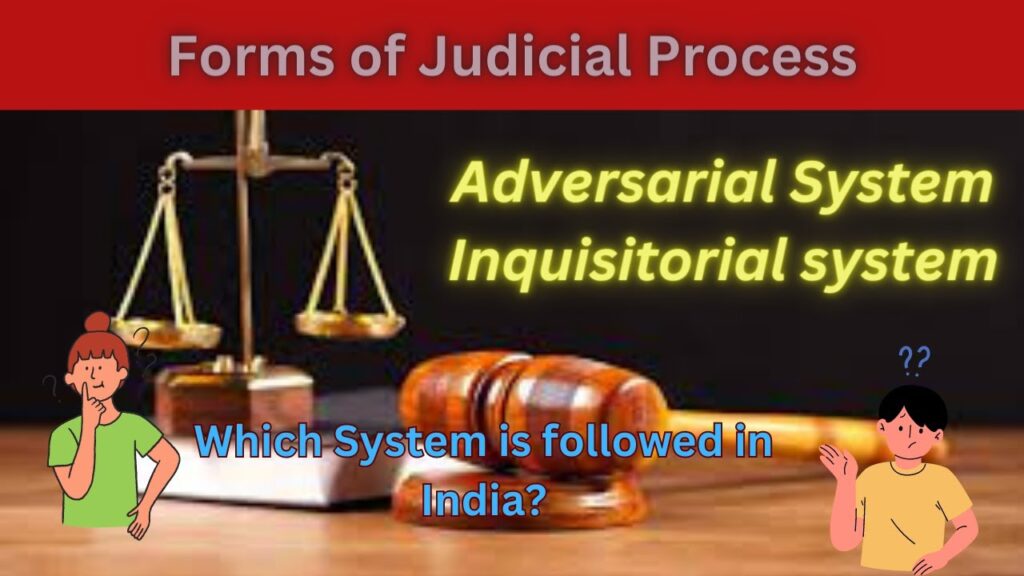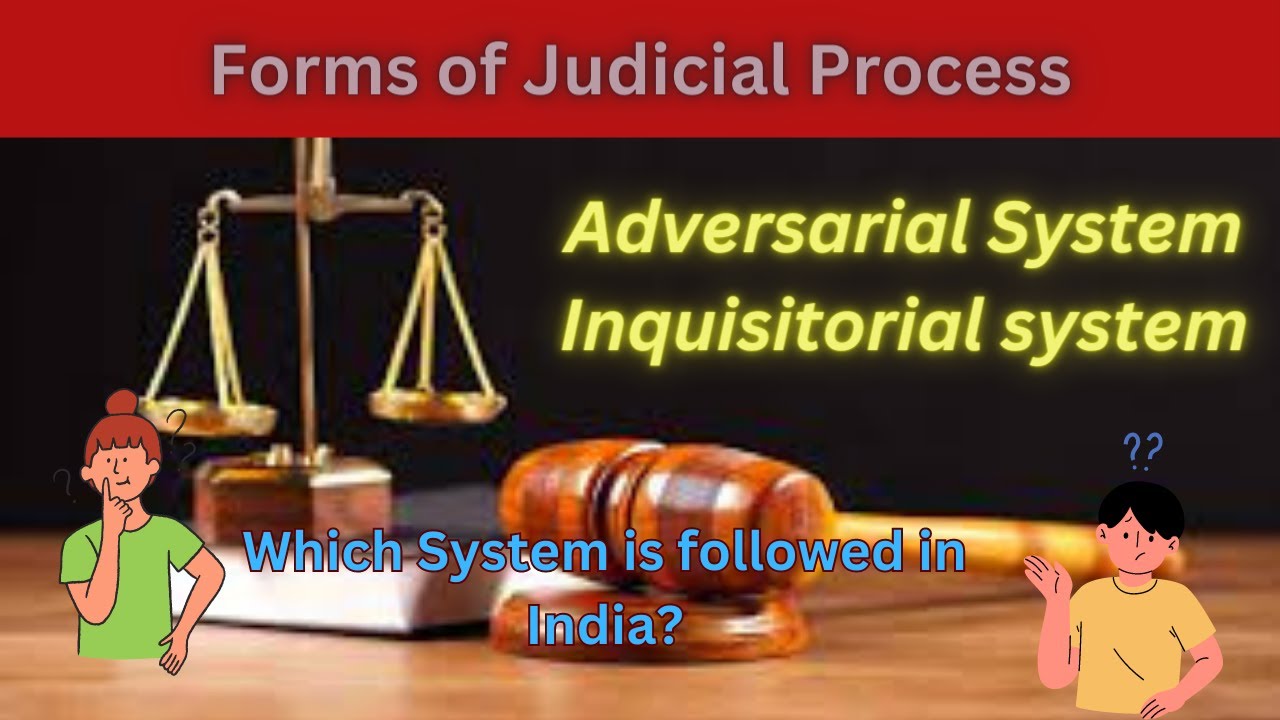
The “Forms of Judicial Process” refer to various methods and procedures through which legal disputes are resolved in a court of law. Different legal systems and jurisdictions may have distinct forms of judicial processes, but several common elements are found across many systems. Here are some key forms of the judicial process:
Adversarial System:
Characteristics: In an adversarial system, legal disputes are resolved through a contest between opposing parties. Each party presents its case, and a neutral third-party judge or jury makes a decision based on the arguments and evidence presented by the parties.
Role of the Judge: The judge acts as an impartial referee, ensuring that legal rules are followed, and may make decisions on procedural matters. The parties are responsible for presenting their evidence and legal arguments.
Common Law Systems: Many common law countries, including the United States and England, use an adversarial system.
Inquisitorial System:
Characteristics: In an inquisitorial system, the court takes a more active role in investigating the facts of a case and determining the applicable law. The judge plays a central role in gathering evidence and questioning witnesses.
Role of the Judge: The judge is often involved in directing the investigation, questioning witnesses, and making determinations based on the information gathered.
Civil Law Systems: Inquisitorial systems are commonly associated with civil law jurisdictions, such as those in continental Europe.
Mixed or Hybrid Systems:
Characteristics: Some legal systems incorporate elements of both adversarial and inquisitorial systems. This hybrid approach aims to combine the strengths of each system while mitigating their weaknesses.
Examples: Certain countries, like Germany and Japan, have adopted mixed or hybrid systems to balance the advantages of an adversarial process with the efficiency of an inquisitorial process.
Alternative Dispute Resolution (ADR):
Characteristics: ADR methods, such as mediation and arbitration, provide alternatives to traditional courtroom litigation. Parties voluntarily agree to resolve their disputes outside of court with the assistance of a neutral third party.
Less Formal: ADR processes are generally less formal and more flexible than traditional judicial proceedings.
Private and Confidential: ADR can be more private and confidential compared to court proceedings.
Administrative Law Processes:
Characteristics: In cases involving government actions or decisions, administrative law processes may come into play. Administrative agencies have specific procedures for handling disputes related to their decisions or actions.
Specialized Tribunals: Administrative law processes often involve specialized tribunals or administrative law judges with expertise in the relevant area.
Appellate Processes:
Characteristics: Appellate processes involve the review of decisions made by lower courts. Appellate courts focus on legal issues and interpretations of law rather than re-examining factual findings.
Hierarchy: In a hierarchical judicial system, decisions made by lower courts can be appealed to higher courts, and the decisions of higher courts may set binding precedents.
Constitutional Review:
Characteristics: Some legal systems include a process for constitutional review, where courts assess the constitutionality of laws or government actions.
Judicial Review: Courts may have the authority to strike down laws or government actions that are found to be inconsistent with the constitution.
These forms of judicial processes provide a framework for resolving legal disputes within a society, and their structure can significantly impact the nature of legal proceedings and the roles of the parties involved. The choice of a particular form often reflects the legal traditions, values, and goals of a jurisdiction.
Difference between Adversarial & Inquisitorial Systesm:
Adversarial System | Inquisitorial System | |
Nature of the Judicial Process | The Judicial Process is a battle between the parties to be won or lost | The dispute is treated as a problem to solved by all participants, including the Court |
Role of the Court | Neutral referee | Principal investigator to ascertain the truth in the dispute |
Role of Lawyers | Principal actor to establish the claims of parties they represent | They are one of the actors in pursuit of truth in the dispute |
Burden of Proof | Accused is assumed to be innocent until proven guilty beyond all reasonable doubt | The standard of proof required is the inner satisfaction or conviction of the Judge |
Legal Reasoning | Largely inductive | Generally deductive |
The adversarial system aims to get the truth through the open competition between the prosecution and the defence. |
The inquisitorial system is generally aims to get the truth of the matter through extensive investigation and examination of all evidence. |
In an adversarial system all parties determine what witnesses they call and the nature of the evidence they give. The court overseeing the process by which evidence is given. | In an inquisitorial system the conduct of the trial is in the hands of the court. The trial judge determines what witnesses to call & order in which they are to be heard. |
You May Like This:
You May Also Like:
Indian Penal Code MCQs Quiz: Section 1 to 5
Indian Panel Code MCQs Quiz on Section 511 and Attempt
IPC MCQs Quiz on Sec. 76 and Sec. 79 | Quiz on Mistake
Practice IPC MCQs online for free (Section 78)
Practice IPC MCQs Quiz for free | Section 81 MCQs | Necessity
Practice IPC MCQs online for free : Infancy (section 82-83)
Specific Principles of Criminal Law | LLM Previous Year Paper 2024 | CCSU
Specific Torts | LLM 4th Semester Previous Year Paper 2024 | CCSU
History and Basic Principles of Criminal Law | Previous Paper 2023
LLM Previous Year Paper 2023 | PRIVILEGED CLASS DEVIANCE
PENOLOGY PREVIOUS YEAR PAPER | LLM | CCSU
LLB Previous Year Paper 2023 | Constitutional Law II | CCSU
LLB Previous Year Paper 2023 | Legal and Constitutional History | CCSU
LLB Previous Year Paper 2023 | Jurisprudence II | CCSU
LLB Hindu Law Previous Year Paper 2023 | CCSU
Euthanasia in India, Right to die with Dignity
Right to Privacy Case Law Mr. X vs. Hospital Z
Federal Constitution Definition and key points
University of Madras vs. Shantabai,1954: Article 12 Case Law
Article 20 Fundamental Right with Case Laws
Article 19 Fundamental Right of Indian Constitution with 10 Case Laws
Article 358, 359 Fundamental rights during emergency
Parliamentary Privileges and Fundamental Rights with Case Laws
Article 14 Fundamental Right with Case Laws
Article 15 Fundamental Right with Case Laws
Article 12 Fundamental Right with Case Laws
DOMESTIC VIOLENCE AS TORT | APPLICATION OF TORT LAW
Crimes without Mens Rea? Statute without Mens Rea.
Definition of crime by various jurists, Criminology
Methods of Studying Criminology
All about Capital Punishment with Case Laws
IMPOSSIBLE ATTEMPT | ATTEMPT VS IMPOSSIBLE ATTEMPT
Difference between Preparation and Attempt
Tests to Determine Attempt and preparation | With Case Laws
Specific Principles of Criminal Law | LLM Previous Year Paper 2024 | CCSU
Specific Torts | LLM 4th Semester Previous Year Paper 2024 | CCSU
History and Basic Principles of Criminal Law | Previous Paper 2023
LLM Previous Year Paper 2023 | PRIVILEGED CLASS DEVIANCE
PENOLOGY PREVIOUS YEAR PAPER | LLM | CCSU
LLB Previous Year Paper 2023 | Constitutional Law II | CCSU
Forms of Judicial Process: Adversarial & Inquisitorial
DOMESTIC VIOLENCE AS TORT | APPLICATION OF TORT LAW
Economic Tort | Business Tort: Application of Tort Law
Crimes without Mens Rea? Statute without Mens Rea.
IMPOSSIBLE ATTEMPT | ATTEMPT VS IMPOSSIBLE ATTEMPT
Mistake of Fact Vs. Mistake of Law | Sec. 76 of IPC


















Leave a Reply